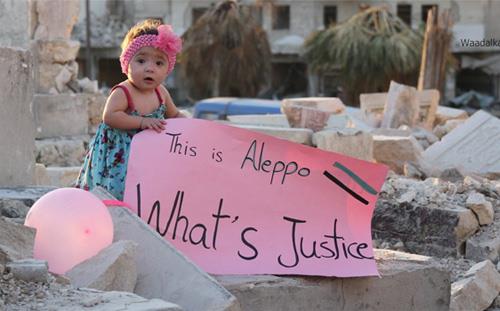
A decade ago, Waad al-Kateab stepped into a new life.
She was 18 and idealistic ("headstrong," her parents said), a freshman at the massive University of Aleppo, in Syria. Then war changed everything.
That's part of the story of For Sama, which reaches PBS at 10 p.m. ET Tuesday (check local listings). The award-winning documentary focuses partly on her decision to stay, even after having baby Sama.
"We stayed with these people in Aleppo for five years …. We just felt we belong to this place, to these people as our family," al-Kateab told the Television Critics Association in July.
So she and her husband, Dr. Hamza al-Kateab, lived under conditions they'd never known.
"Waad and Hamza are middle-class, educated, fundamentally secular," said Edward Watts, who co-directed the film with her. Now they were short of food and water, with constant bomb blasts nearby.
This started optimistically, with the 2011 Arab Spring demanding freedoms. In Egypt and Tunisia, regimes ended peacefully; in Libya, it ended by revolution. "We were sure we would win," Waad (we'll use first names to avoid confusion) says in the film. "We would live in a free world."
But Syria was different. Watts said U.S. officials told him that Bashar al-Assad "would stop at nothing in order to stay in power."
The rebels' stronghold was in the east part of Aleppo, a city that once had six million people. Many left, including Hamza's first wife; 32 doctors remained, putting him in charge of a makeshift hospital.
This became complicated when others took sides.
ISIS wanted to help the rebels; the Russians – who seemed to target hospitals, Hamza said – did massive bombing for the regime.
Waad kept filming reports for the internet. It was "amazing stuff that had been on the news in the U.K. and gathered all this attention," Watts said. It "really brought home the conflict to people."
One day, Hamza ousted her from the operating room for showing her anguish. They met afterward, and he said he was in love. The film includes their wedding reception in the hospital – a gorgeous young bride in white, dancing with her husband to Julio Iglesias singing Willie Nelson's "Crazy."
In the years that followed, things were more difficult. Sama was born into a time of persistent bombing. The family lived in the hospital, rushing to the basement during each attack.
At one point, they left to visit an ill family member in Turkey. Resisting pleas to stay there, they returned. "Any doctor will make a difference in that situation," Waad said. "I'm a journalist, and every single picture will make a difference."
The hospital continued its work until there was a United Nations plan for rebels to exit the country. In its last 20 days, Waad said, the hospital (now with ten doctors) saw 6,000 patients and performed 890 operations.
When they reached London, Watts said, Waad was asked if she had any more film. "She went, 'Yeah' and (brought) this great stack of war-battered hard-drives."
It took two years to turn 500 hours into a 100-minute film, re-fashioned into a video letter to Sama. It played in theaters and won the top documentary prizes at the Cannes and South by Southwest festivals.
Now the family lives in London, where Waad can continue her journalism, and Hamza is working with a Syrian-relief agency. ("Maybe in a couple years, I will be back to practicing medicine.") Sama – who has a younger sibling, also born in Aleppo – is almost 4.
"She's doing well," Hamza said. "She has some nightmares, (waking) up in the middle of the night, just screaming …. We can't tell what she's suffering from until she's like 4 or 5 and can express herself."
By then, she may realize she's the emotional core of a movie that has drawn standing ovations.